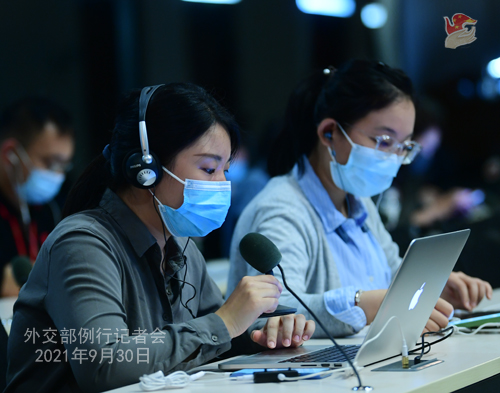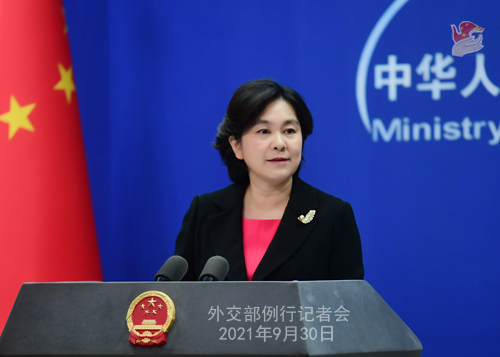
CCTV: The High-Level Week of the 76th session of the General Assembly of the United Nations was concluded at the UN headquarters in New York on September 27. China has been very active in both Beijing and New York in recent days. How do you see China's performance at UNGA meetings this year?
Hua Chunying: This UNGA has received great attention as our world is facing the combined impacts of changes unseen in a century and the COVID-19 pandemic, and is now in the period of new turbulence and adjustment. The General Debate of this session of the UNGA was held both online and offline from September 21 to 27, and leaders from altogether over 190 countries made statements. All parties called on major countries to strengthen solidarity and cooperation, avoid division and confrontation, and hoped to see more cooperation in poverty alleviation and climate change, among other areas. They believe the world needs a spirit that serves the welfare of humanity instead of self-interests in the future.
China attaches great importance to the role of and cooperation with the UN. China highly values this session of the UNGA. President Xi Jinping virtually attended the General Debate and made an important statement, in which he put forward the Global Development Initiative, emphasized accelerating the implementation of the UN 2030 Agenda for Sustainable Development, and pursuing more robust, greener and sound global development. President Xi also expounded on China's propositions on such issues as fighting the pandemic in solidarity, economic recovery, development of international relations and improvement of global governance, offering China's proposal to the world at a new historical crossroads. State Councilor and Foreign Minister Wang Yi attended many UNGA activities, including the high-level meeting of the UN General Assembly to commemorate the 20th anniversary of the adoption of the Durban Declaration and Programme of Action via video link, the Meeting of Foreign Ministers of Permanent Members of the UN Security Council and the UN Secretary-General via video link, G20 Foreign Ministers' Video Conference on Afghanistan, and meetings with UN Secretary-General Guterres and President of the UNGA Abdulla Shahid. The international community shares the view that China has made important contributions to responding to global challenges and promoting the UN to play a bigger role. Facts have proven again that China is an advocate of world peace, a contributor to global development, a defender of the international order and a provider of public good.
At the Meeting of Foreign Ministers of Permanent Members of the UN Security Council and the UN Secretary-General, State Councilor and Foreign Minister Wang Yi put forward key messages of carrying out duties, fulfilling obligations, shouldering responsibilities and making a difference. He called on major countries to set examples in upholding multilateralism and inject more confidence and stability to the world, instead of practicing unilateralism and hegemony in the name of multilateralism. One can expect China's support for the UN, which is lasting and reliable. China will continue to work with other countries to accelerate the implementation of the UN 2030 Agenda for Sustainable Development, strengthen anti-epidemic cooperation, actively address climate change, advance democracy and rule of law in international relations, practice the philosophy of international relations featuring mutual respect and win-win cooperation and true multilateralism, and build the UN into a central platform for countries to jointly safeguard universal security, share development achievements and chart the course for the future of the world.
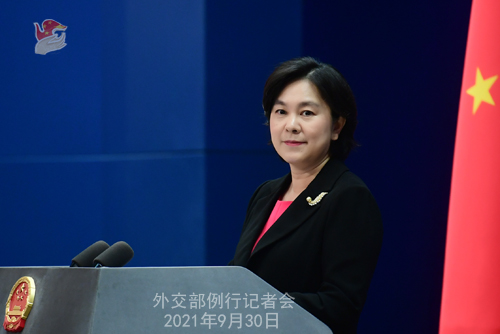
Macau Monthly: On September 29, US ambassador to Indonesia and Special Representative for the DPRK Sung Kim reportedly said at an online forum that AUKUS is a "forward looking, positive" initiative and will not pose threat to the stability of the Indo-Pacific. He said he is not worried that AUKUS would cause an arms race or nuclear proliferation. What is China's comment?
Hua Chunying: We have noticed the reports you mentioned. In fact, for days, different parties of the international community have expressed concerns and worries about the nuclear submarine cooperation among the US, the UK and Australia. I wonder where the confidence in the remarks of the US Ambassador to Indonesia came from and on what basis. In fact, Russian Deputy Foreign Minister Sergey Ryabkov said the other day that Russia has raised a range of questions concerning the AUKUS establishment to the US side, which include whether the nuclear submarine cooperation correlates with international non-proliferation requirements.
China believes that the nuclear submarine cooperation among the US, the UK and Australia creates serious nuclear proliferation risks, clearly violates the spirit of the Treaty on Non-Proliferation of Nuclear Weapons (NPT). It will not only have a far-reaching impact on the international non-proliferation system, but also bring real threats to regional peace and stability.
The questions raised by Russian Deputy Foreign Minister Ryabkov actually reflect the common concerns of the international community. The three countries should treat the concerns of all parties seriously and make response to each and every one of them:
First, in what way can the US confirm that its provision of weapons-grade highly-enriched uranium meet international non-proliferation rules and requirements?
Second, how does Australia ensure that the weapons-grade highly-enriched uranium is not excluded from effective safeguards of the IAEA?
Third, if Australia, a non-nuclear-weapon state, can possess weapons-grade highly-enriched uranium, then for what reason the US, the UK and Australia oppose DPRK, Iran and other countries in doing the same?
Fourth, if the US can flagrantly transfer highly sensitive nuclear materials and nuclear technologies to Australia in disregard of international rules and nuclear proliferation risks, then should it immediately stop unilateral sanctions and long-arm jurisdictions over others including the DPRK and Iran for developing nuclear technologies?
Fifth, if all countries turn a blind to rules and conduct nuclear proliferation activities without restrictions as the US, the UK and Australia did, then where is the authority and the meaning of existence of the NPT and international non-proliferation system?
Yesterday, State Councilor Wang Yi pointed out in his phone calls with foreign ministers of Malaysia and Brunei that the nuclear submarine cooperation among the US, the UK and Australia may bring five dangers to the region. First, it could create nuclear proliferation risks and shocks to the international non-proliferation system. Second, it could induce a new round of arms race, as other countries could follow suit and even cross the nuclear threshold. Third, it could undermine regional prosperity and stability and create regional tensions. Fourth, it could undercut ASEAN countries' efforts to build a Nuclear-Weapon-Free Zone (NWFZ) in Southeast Asia. Fifth, it could lead to the resurgence of Cold War mentality, provoke bloc confrontation and zero-sum geopolitical games in the region.
I also want to stress that AUKUS, like Quad, is subservient to and serves the Indo-Pacific strategy with US dominance. It seeks to start things anew in the region and is a move against the trend of the times. Regional countries and the international community should stay wary of and be opposed to this. China will stay in communication with the Secretariat and other member states of the IAEA to resolutely defend the authority and efficacy of the international non-proliferation system.

China Daily: We have noted that China's first batch of emergency humanitarian assistance has arrived in Afghanistan. Can you confirm that and give us more details?
Hua Chunying: On the evening of September 29, the first batch of emergency humanitarian assistance delivered by the Chinese government to Afghanistan arrived at Kabul International Airport. Chinese Ambassador to Afghanistan and Acting Minister of Refugee Affairs of the Afghan interim government co-chaired the handover ceremony held at the airport.
As a friendly neighbor of Afghanistan, China has always paid close attention to the needs of the Afghan people. China has overcome numerous difficulties and delivered to Kabul in a short period of time blankets, down jackets and other winter supplies urgently needed by the Afghan people. This is a strong testimony that China has been earnestly fulfilling its assistance commitment to Afghanistan and making every effort to help the Afghan people tide over difficulties. The Chinese side will continue to speed up the preparation of food and other supplies, which will soon be delivered to Afghanistan.
Acting Minister of Refugee Affairs of Afghanistan's interim government expressed deep gratitude to China for providing emergency humanitarian aid in a timely manner when the Afghan people are pulling through the most difficult time. Afghanistan is in dire need of assistance from the international community in various fields as it faces extremely severe economic and livelihood difficulties. Afghanistan will honor its commitments to its neighbors and the international community. The Afghan side said that as winter is drawing near, almost a million displaced people need to be housed, clothed and fed, and hoped that the international community can lend a helping hand.
Afghanistan is still facing severe challenges such as humanitarian and livelihood issues and the COVID-19 epidemic. The international community should make concerted efforts to help the Afghan people tide over the difficult time. In particular, countries that started the Afghan issue should earnestly shoulder their due responsibility to Afghan people, act in a responsible manner and do more tangible things to ease the difficulties faced by the Afghan people as soon as possible.
Yonhap News Agency: DPRK leader Kim Jong-un said he is willing to restore the North-South communication lines, but also accused the US of proposing talks without changing its "hostile policy" toward the DPRK. Do you have any comment?
Hua Chunying: As a close neighbor of the Korean Peninsula, China always supports the DPRK and the ROK in improving relations and advancing reconciliation and cooperation through dialogue and consultation. We hope relevant measures can play a positive role in improving and developing the inter-Korean relations.
We believe under the current circumstances, the key to breaking the stalemate and restarting dialogue is taking seriously and resolving the DPRK's legitimate concerns. The US should avoid repeating empty slogans, but rather show its sincerity by presenting an appealing plan for dialogue. It is imperative to invoke the rollback terms of the Security Council's DPRK-related resolutions as soon as possible and make necessary adjustments to relevant sanctions, especially those relating to provisions on the humanitarian and livelihood aspects. This will be conducive to resuming dialogue, and maintaining peace and stability on the Korean Peninsula, and is in line with the spirit of the resolutions.
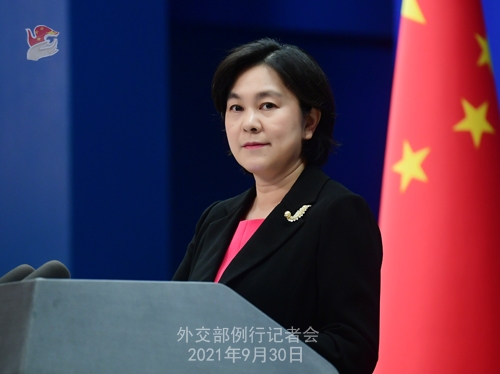
Beijing Youth Daily: US Commerce Secretary Gina Raimondo said in an interview the other day that the US doesn't want China to write the rules of the road. "If we really want to slow down China's rate of innovation, we need to work with Europe, to write the rules of the road for technology", whether it's artificial intelligence or cyber. Do you have any comment?
Hua Chunying: The remarks of this US official again exposes the US true intention to contain and block China's development by all means. This is quintessential autocracy and bullying.
China always believes that all countries have equal opportunity and right to development. International rules should be what is recognized by all countries, rather than something that is decided by a few. Cooperation between countries should be aimed at serving the interests of the whole mankind, instead of ganging up against certain countries based on ideology and seeking global hegemony through bloc politics. Any political manipulation and oppression that threatens to hold back other countries' development and harm their people's right to development and a better life will find no support and is doomed to fail.
China maintains that international affairs should be addressed through consultation. All countries should remain committed to extensive consultation, joint contribution and shared benefits, promote equal rights, opportunities and rules of all, discard small cliques and zero-sum game, adhere to inclusiveness rather than exclusiveness, and engage in international cooperation in a more open, equal and fairer manner.
Beijing Daily: Bloomberg reported that US Special Presidential Envoy for Climate John Kerry said in an interview on September 29 that he was hopeful that China "will make the decision that they could move further with respect to the reduction of emissions during the course of the next 10 years", calling this a "critical decade" for keeping global warming in check. Do you have any response?
Hua Chunying: The global impact of climate change is becoming increasingly severe. During the just-concluded General Debate of the UNGA, many countries expressed the hope to work together to address climate change. We believe that every year is crucial for countries to increase their ambition to reduce emissions and step up their actions for implementation. China has always been taking actions to promote global climate governance. Having over-fulfilled the climate action goals of 2020 ahead of schedule, President Xi Jinping has announced China's objective and vision of carbon peaking, carbon neutrality and new goals of and measures for nationally determined contributions since September last year. It involves carbon dioxide emissions per unit of GDP, the share of non-fossil fuels in primary energy consumption, the total installed capacity of wind and solar power, coal consumption and many other aspects. Not long ago, President Xi reiterated that China will step up support for other developing countries in developing green and low-carbon energy. China has been doing its best and putting pressure on itself to step up climate action and make greater contribution to the global response to climate change.
But at the same time, we have to stress that addressing climate change is a cause that requires the joint efforts of all countries around the world and calls for the concerted efforts of the international community. Developed countries should earnestly follow the principle of common but differentiated responsibilities, face up to their historical responsibilities and show greater ambition and actions. They should provide financial, technological and capacity building support to help developing countries enhance their capacity to respond to climate challenges.
Bloomberg: French Senator Alain Richard will lead a French delegation visiting Taiwan soon. Does the foreign ministry have any comment on this visit?
Hua Chunying: The one-China principle is the political foundation for China to develop friendly and cooperative relations with other countries, including France. China firmly opposes all forms of official contact and exchanges between certain French congressmen and the Taiwan authorities. We urge relevant individuals to abide by the one-China principle and safeguard the favorable environment for normal development of bilateral relations.
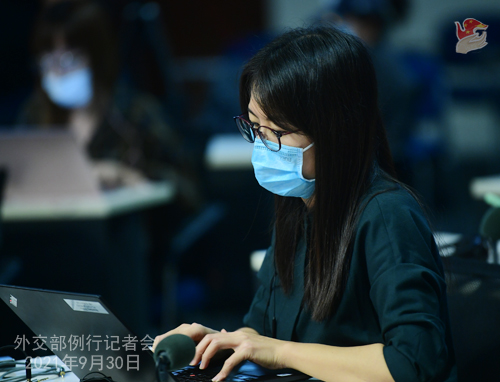
NHK: The International Olympic Committee (IOC) announced that due to the need of COVID-19 containment, tickets to the Beijing 2022 will be sold exclusively to spectators residing in China's mainland, who meet the requirements of the COVID-19 prevention and control measures. What is your comment?
Hua Chunying: I may not be in the best position to give a comment on this matter.
When hosting the Tokyo Olympics, did Japan invite spectators overseas? I don't think so.
The IOC President Thomas Bach held an Executive Board meeting the other day, where key COVID-19 prevention and control measures of the Beijing 2022 Olympic and Paralympic Winter Games were deliberated. Facing the uncertainties in the spread of COVID-19, the Beijing 2022 Organizing Committee established a working mechanism for meeting and consultation with the IOC and maintained close communication with all stakeholders. With a high sense of responsibility toward the life and health of athletes, the big Olympic family and all stakeholders, the Organizing Committee adheres to the bottom line of safety and prioritizes COVID-19 prevention and control in order to host a safe event as scheduled. Spectators overseas can enjoy the impressive event on television.
After it successfully hosted the Tokyo Olympic Games, Japan is believed to have more understandings about how to safely host the event. China provided strong support to the Japanese side in hosting the successful games. We hope we can receive understanding and support from Japan, too.
******************************
Tomorrow will be China's National Day. As per public holiday schedule, our regular press conference will be in recess from October 1 to October 7 and resumed on October 8. Although we won't meet in-person during the recess, you may still reach the MFA Spokesperson's Office via fax, e-mail and WeChat. We will do our best to give you timely reply.
I wish you all a happy holiday!
